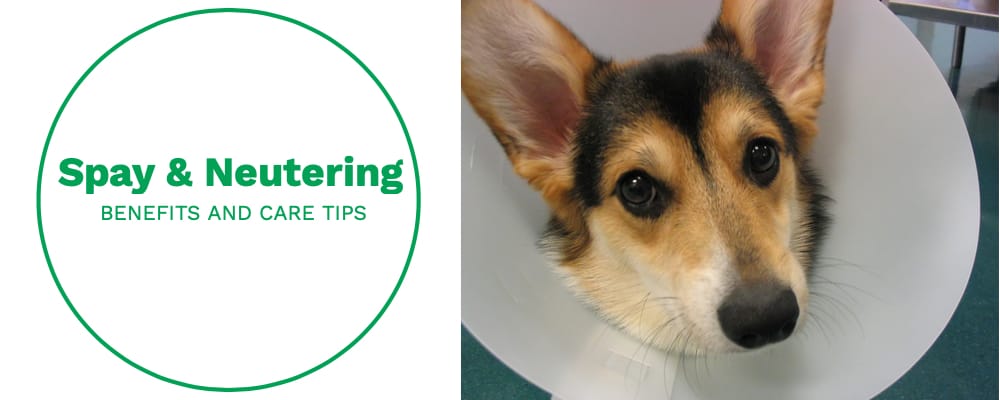There are medical and behavioral benefits to spaying (female pets) and neutering (male pets) your animals.
Here are some of the medical benefits:
Your female pet will live a longer, healthier life. Spaying helps prevent uterine infections and breast tumors, which are malignant or cancerous in about 50 percent of dogs and 90 percent of cats. Spaying your pet before her first heat offers the best protection from these diseases, however there may be benefits of waiting a little longer in some dog breeds. Ask your veterinarian for a recommendation.
Neutering your male companion prevents testicular cancer and prostate problems.
And behavioral benefits:
- Your spayed female pet won’t go into heat. While cycles can vary, female felines usually go into heat four to five days every three weeks during breeding season. In an effort to advertise for mates, they’ll yowl and urinate more frequently—sometimes all over the house!
- Your male dog will be less likely to roam away from home.An intact male will do just about anything to find a mate, including finding creative ways escape from the house. Once he’s free to roam, he risks injury in traffic and fights with other male animals.
- Your neutered male may be better behaved.Unneutered dogs and cats are more likely to mark their territory by spraying strong-smelling urine all over the house. Your dog might be less likely to mount other dogs, people and inanimate objects after he’s neutered. Some aggression problems may be avoided by early neutering.
Spaying/neutering your pets is also highly cost-effective. The cost of your pet’s spay/neuter surgery is far less than the cost of having and caring for a litter.
Debunking Spay/Neuter Myths and Misconceptions
- Spaying or neutering will not cause your pet to become overweight. Lack of exercise and overfeeding will cause your pet to pack on the extra pounds—not neutering. Your pet will remain fit and trim as long as you continue to provide exercise and regulate her food intake.
- Neutering is not as a quick fix for all behavior problems. Although neutering your pet often reduces undesirable behaviors caused by a higher level of testosterone, there’s no guarantee that your dog’s behavior will change after he’s neutered. Although the surgery will reduce the amount of testosterone in your dog’s system, it won’t eliminate the hormone completely. Neutering will also not reduce behaviors that your pet has learned or that have become habitual. The effects of neutering are largely dependent on your dog’s individual personality, physiology and history.
Helping Your Pet Before and After Surgery
Avoid giving your pet any food after midnight the night before surgery. Water can be left out until you leave the house.
Your veterinarian will provide post-operative instructions for you to follow. Although your pet may experience some discomfort after surgery, medication for pain will be sent home with your pet.
Here are tips for a safe and comfortable recovery:
- Provide your pet with a quiet place to recover indoors and away from other animals.
- Prevent your pet from running and jumping for as long as your veterinarian recommends.
- Prevent your pet from licking the incision site, which may cause infection, by distracting your pet or by using an Elizabethan collar.
- Avoid bathing your pet for at least ten days after surgery or until sutures are removed.
- Check the incision site daily to confirm proper healing.
If you notice excessive redness, swelling or discharge at the surgery site, or if the incision is open, please contact your veterinarian. Also call your veterinarian if your pet is lethargic, is vomiting or has diarrhea or any other concerns following surgery.
Spaying/neutering kittens is done at 6 months of age. Recommendations for the best age to spay or neuter your dog vary according to their size and breed. Ask your veterinarian for a recommendation.
